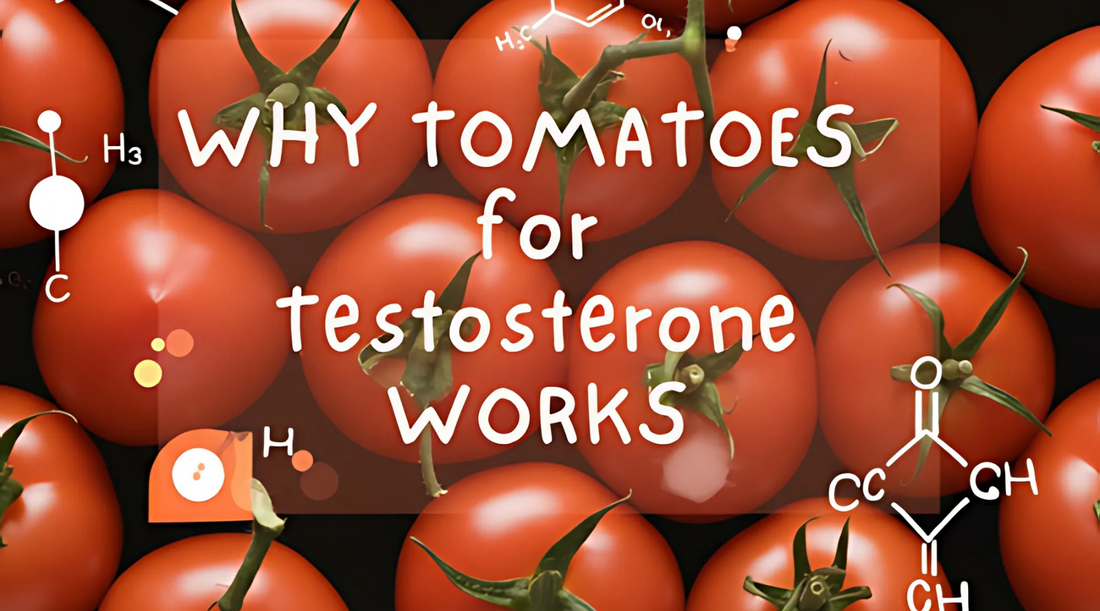
Why "Tomatoes for Testosterone" Works
Share
Testosterone plays a pivotal role in men's health. From muscle growth and energy levels to maintaining a sharp mind and healthy libido, this vital hormone impacts nearly every aspect of a man’s well-being. However, as men age, testosterone levels naturally decline, leading many to seek solutions for boosting or maintaining their hormonal health. One approach gaining attention? Incorporating the humble tomato into your diet.
Packed with essential nutrients like lycopene, vitamins, and antioxidants, tomatoes have been linked to numerous health benefits, including support for testosterone production and overall hormonal balance. This blog explores the science behind why tomatoes are a testosterone-boosting powerhouse, shares practical tips for making them part of your daily routine, and digs into the research to separate fact from hype.
The Science Behind Tomatoes and Testosterone
1. Lycopene and Hormonal Health

Tomatoes are one of the richest sources of lycopene, a powerful antioxidant that gives them their vibrant red color. But lycopene does more than provide aesthetic appeal—it combats oxidative stress, which is known to disrupt hormone production.
Oxidative stress occurs when harmful free radicals overwhelm the body’s natural defenses, potentially damaging cells, including those responsible for testosterone production. By neutralizing free radicals, lycopene helps protect these cells, allowing the body to maintain optimal testosterone levels.
Scientific Evidence:
Research published in Nutrients (2020) highlights the role of antioxidants in improving testosterone levels by reducing oxidative stress (Nutrients, 2020). Another review in the Asian Journal of Andrology found that higher antioxidant intake, including lycopene from tomatoes, was associated with better sperm parameters and hormonal balance in men (Asian J Androl, 2018).
A landmark study from the University of Sheffield showed that men given lycopene supplements (equivalent to about two tins of tomatoes a day) experienced improved sperm quality and reduced damage to reproductive cells (European Journal of Nutrition, 2019).
2. Nutrient Support for Testosterone Production
Aside from lycopene, tomatoes are packed with vitamins and minerals that support testosterone production and overall health:

- Vitamin C: Helps reduce cortisol, a stress hormone known to suppress testosterone levels. Lower cortisol equates to higher testosterone production.
- Potassium: Plays a role in metabolic processes that influence hormone production.
- Vitamin A: Supports the health of Leydig cells, the testosterone-producing cells in the testes.
- Folate: Assists with DNA synthesis and cell division, which is crucial for reproductive health.
Together, these nutrients create a hormonal support system, ensuring the body has the tools it needs to produce and maintain testosterone.
In the Literature:
According to a 2022 review in Frontiers in Endocrinology, proper intake of micronutrients such as Vitamin C, Vitamin A, and potassium may support hormone health and prevent deficiencies that can lead to disrupted testosterone levels (Frontiers in Endocrinology, 2022).
3. Reducing Risk Factors for Low Testosterone

Maintaining testosterone isn’t just about hormone production—it’s also about mitigating risk factors like obesity and inflammation. A diet rich in tomatoes has been shown to:
- Reduce body fat thanks to tomatoes’ low calorie and high fiber profile, which supports weight management.
- Fight chronic inflammation associated with high-fat diets or sedentary lifestyles, aiding in better hormonal balance.
According to a comprehensive meta-analysis from Critical Reviews in Food Science and Nutrition (2021), regular tomato or lycopene intake has an anti-inflammatory effect that can support metabolic and hormonal health (CRFSN, 2021).
More Ways Tomatoes Benefit Men's Health
Aside from their potential testosterone-boosting effects, tomatoes are associated with improved cardiovascular health, reduced risk of prostate cancer, and protection against metabolic syndrome. These broader benefits make tomatoes a nutritional asset for men looking to safeguard their long-term well-being.
In fact, the World Cancer Research Fund reports that cooked tomatoes may help reduce the risk of prostate cancer, a major concern for men's health (WCRF, 2023). Incorporating tomatoes regularly may have a protective effect thanks to their rich antioxidant profile.
Practical Tips for Adding Tomatoes to Your Diet
When it comes to reaping the benefits of tomatoes, consistency is key. Here are some simple, delicious ways to incorporate tomatoes into your meals every day:

1. Start with Breakfast
- Tomato Omelets: Add a handful of diced tomatoes to your morning eggs for a nutrient boost.
- Smoothie Add-Ins: Blend tomato juice with spinach, cucumber, and a splash of lemon for a refreshing, antioxidant-packed morning drink.
2. Upgrade Your Lunch

- Tomato Soup: A soothing bowl of tomato soup is rich in lycopene, especially if made with cooked tomatoes.
- Salads with Fresh Tomatoes: Toss cherry or beefsteak tomatoes into leafy greens, adding olive oil for a healthy fat to maximize lycopene absorption.
3. Snacks and Sides
- Tomato Salsa: Perfect for pairing with whole grain crackers, salsa is a low-calorie and tasty option.
- Caprese Skewers: Alternate cherry tomatoes, fresh mozzarella, and basil leaves on skewers for a portable, nutrient-dense snack.
4. Dinner Favorites
- Tomato-Based Sauces: Incorporate tomatoes via marinara sauces for pasta, pizza, or even zoodles (zucchini noodles).
- Grilled Tomatoes: Enhance the natural sweetness of tomatoes by grilling them with a drizzle of olive oil.
5. Drinks to Wrap Up the Day
- Spicy Tomato Juice: Blend tomato juice with a dash of cayenne and black pepper for a metabolism-boosting, anti-inflammatory drink.
- Tomato Gazpacho: This chilled Spanish soup serves as a refreshing end-of-day option loaded with nutrients.
Keep in mind that pairing tomatoes with good fats (like olive oil or avocado) helps your body absorb lycopene more efficiently.
Cooked Versus Raw Tomatoes

To maximize lycopene absorption, consider including cooked tomatoes in your diet. Cooking breaks down the tomato’s cell walls, making the lycopene more bioavailable for your body. Pair cooked tomatoes with healthy fats—like olive oil or avocado—to further improve absorption.
That doesn’t mean you should avoid raw tomatoes. Those juicy, fresh slices still provide fiber, vitamin C, and potassium for a well-rounded nutrition profile. A mix of both raw and cooked tomatoes is ideal for reaping all their health benefits.
Potential Considerations and Side Effects
For most people, adding tomatoes to your diet is safe and beneficial. However, individuals with certain gastrointestinal conditions (like acid reflux) might want to limit raw tomato intake, as they can sometimes aggravate symptoms. Discuss dietary changes with your healthcare provider if you have concerns.
A Call to Action for Better Health
When it comes to maintaining testosterone levels and improving overall health, the solution may be as simple as adding more tomatoes to your plate. Their lycopene, essential nutrients, and anti-inflammatory properties provide science-backed support for hormonal health, while their versatility in recipes ensures they’ll never get boring.
Make it a goal to include tomatoes in your daily meals. Whether raw in a salad, blended into a smoothie, or simmered into a sauce, tomatoes offer an easy and delicious way to protect your testosterone levels and overall well-being.
Start today—your body will thank you.
FAQs: Tomatoes, Testosterone & Men’s Health
Q1: Can tomatoes really increase testosterone levels?
A: While tomatoes themselves don’t directly boost testosterone like medication, their nutrients—especially lycopene and antioxidants—help reduce oxidative stress, which protects and supports the body’s natural testosterone production. Regularly eating tomatoes can contribute to overall hormonal health.
Q2: Are cooked or raw tomatoes better for testosterone?
A: Both are beneficial, but cooked tomatoes provide more bioavailable lycopene, which is linked to hormonal support. Pairing cooked tomatoes with healthy fats further boosts absorption.
Q3: How often should I eat tomatoes for health benefits?
A: Studies often use the equivalent of a serving or two of tomatoes daily. Aim for a consistent intake—try to include tomatoes at least several times per week in various forms.
Q4: Are there other foods that support testosterone production?
A: Yes! Aside from tomatoes, foods like fatty fish, eggs, leafy greens, nuts, and seeds are supportive. Maintaining a balanced, nutrient-rich diet is key.
Q5: Are there any risks to eating too many tomatoes?
A: Tomatoes are generally safe for most people, but excessive intake could aggravate acid reflux or other gastrointestinal issues for some individuals. Moderation is best, and variety in your diet is important.
Q6: Are tomato supplements as effective as fresh tomatoes?
A: While some studies use lycopene supplements, whole tomatoes provide a range of nutrients and fiber, making them a better choice for most people.
Read More Of Our Blogs
The Ultimate Skin Care Routine For Men
7 Football Game Day Must Haves
References
- Nutrients, 2020 – The Role of Antioxidants in Testicular Function and Male Fertility
- Asian Journal of Andrology, 2018 – Oxidative stress and male infertility: a clinical perspective
- European Journal of Nutrition, 2019 – A randomized controlled trial investigating the effect of oral lycopene supplementation
- Frontiers in Endocrinology, 2022 – Micronutrient status and testosterone
- Critical Reviews in Food Science and Nutrition, 2021 – Health benefits of tomato consumption
- World Cancer Research Fund, 2023 – Cooked tomatoes and prostate cancer risk
